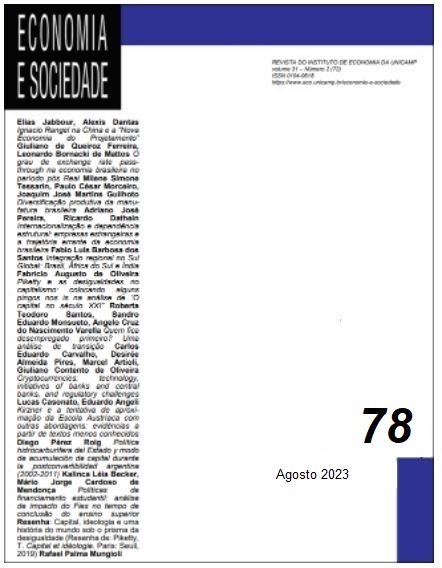Resumo
A literatura mostra que a participação das famílias na vida escolar dos seus filhos pode ter efeitos importantes sobre os resultados dos alunos. No entanto, ainda há poucas evidências deste efeito em países em desenvolvimento. No Brasil, uma iniciativa recente para aumentar a participação dos pais no ambiente escolar e vida escolar dos filhos foi o programa Coordenador de Pais (CP), implementado entre 2012 e 2013. Este artigo avalia os impactos do programa CP adotado no Espírito Santo sobre o desempenho, a frequência e a evasão utilizando um painel de alunos do 9º ano do Ensino Fundamental ao 3º ano do Ensino Médio e dados administrativos únicos de 2011 a 2014. A partir de uma estratégia de diferenças-em-diferenças, os resultados indicam que o programa aumentou o comparecimento nas aulas e a retenção dos alunos na escola.
Referências
CAAL, S. et al. Abriendo portas: evaluating of parent education program for latinos. Hispanic Journal of Behavioral Sciences, v. 41, n. 2, p. 231-249, 2017.
CARTER, S. The impact of parent/family involvement of student outcomes: an annotated bibliography of research from the past decade, 2002.
COLEMAN, J. S. The Coleman report. Equality of educational opportunity. Washington: US Government Printing Office, 1966.
CUNHA, F., ELO, I. T., CULHANE, J. F. Eliciting maternal subjective expectations about the technology of cognitive skill formation, 2013.
DE SENA, M. C., DA SILVA, G., DA SILVA, A. F.; DE OLIVEIRA BASTOS, P. R. H. Os efeitos da pandemia na educação de crianças e adolescentes no Brasil. Lex Cult Revista do CCJF, v. 5, n. 1, p. 107-119, 2021.
DESFORGES, C.; ABOUCHAAR, A. et al. The impact of parental involvement, parental support and family education on pupil achievement and adjustment: a literature review. DfES Publications Nottingham, v. 433, 2003.
EPSTEIN, J. L. Toward a theory of family-school connections: teacher practices and parent involvement. In: HURRELMAN, K.; KAUFMAN, F. X.; LOSEL, F. (Ed.). Social intervention: potential and constraints. Berlin, Germany: de Gruyer, 1987. p. 121-136.
EPSTEIN, J. L. School, family, and community partnerships: pre-paring educators and iroving schools. Boulder, CO: Westview, 2001.
EPSTEIN, J. L.; DAUBER, S. L. School programs and teacher practices of parent involvement in inner-city elementary and middle schools. The Elementary School Journal, p. 289-305, 1991.
EPSTEIN, J. L.; SANDERS, M. G. Family, school, and community partnerships. In: BORNSTEIN, M. H. (Ed.). Handbook of parenting: v. 5. Practical issues in parenting. Mahwah, NJ: Erlbaum, 2002. p. 507-537, 2002.
FERNANDES, C.; VÁZQUEZ, L. A.; BIZZOTTO, P.; PIMENTA, R. D. S.; BORGES, T. P. Recuperação da aprendizagem no ensino médio: mitigando os efeitos da pandemia de COVID-19. 2022.
GERTLER, P.; PATRINOS, H. A.; RUBIO-CODINA, M. Empowering parents to improve education: evidence from rural Mexico. World Bank, Human Development Network, Education Team, 2006.
HOUTENVILLE, A. J.; CONWAY, K. S. Parental effort, school resources, and student achievement. Journal of Human resources, v. 43, n. 2, p. 437-453, 2008.
JEYNES, W. H. A meta-analysis of the relation of parental involvement to urban elementary school student academic achievement. Urban Education, v. 40, p. 237-269, 2005.
JEYNES, W. H. The relationship between parental involvement and urban secondary school student academic achievement: a meta-analysis. Urban Education, v. 42, p. 82-110, 2007.
JEYNES, W. A meta-analysis of the efficacy of different types of parental involvement programs for urban students. Urban Education, v. 47, n. 4, p. 706-742, 2012.
JIMENEZ, E.; SAWADA, Y. Do community-managed schools work? An evaluation of el Salvador’s educo program. The World Bank Economic Review, v. 13, n. 3, p. 415-441, 1999.
KRAFT, M. A.; DOUGHERTY, S. M. The effect of teacher-family communication on student engagement: evidence from a randomized field experiment. Journal of Research on Educational Effectiveness, v. 6, n. 3, p. 199-222, 2013.
McINTOSH, J. Family background parental involvement and academic achievement in Canadian schools. Economics Department Concordia University, 2008.
MO, Y.; SINGH, K. Parents’ relationships and involvement: effects on students’ school engagement and performance. 2008.
O’DONNELL, J.; KIRKNER, S. L. The impact of a collaborative family involvement program on latino families and children’s educational performance. School Community Journal, v. 24, n. 1, p. 211, 2014.
PHILLIPS, M. Parenting, time use, and disparities in academic outcomes. In: DUNCAN, Greg J.; MURNANE, Richard J. (Ed.). Whither opportunity. Russell Sage Ed., 2011.
REYNOLDS, A. J.; TEMPLE, J. A. Extended early childhood intervention and school achievement: age thirteen findings from the Chicago longitudinal study. Children Development, v. 69, n. 1, p. 231-246, 1998.
SHERIDAN, S. M.; KNOCHE, L. L.; EDWARDS, C. P.; BOVAIRD, J. A.; KUPZYK, K. A. Parent engagement and school readiness: effects of the getting ready intervention on preschool children’s social-emotional competencies. Early Education and Development, v. 21, n. 1, p. 125-156, 2010.
TOPOR, D. R.; KEANE, S. P.; SHELTON, T. L.; CALKINS, S. D. Parent involvement and student academic performance: a multiple mediational analysis. Journal of Prevention & Intervention in the Community, v. 38, n. 3, p. 183-197, 2010.
VAN VOORHIS, F. L.; MAIER, M. F.; EPSTEIN, J. L.; LLOYD, C. M. The impact of family involvement on the education of children ages 3 to 8: a focus on literacy and math achievement outcomes and social-emotional skills. MDRC, 2013.
WANG, M.-T.; HILL, N. E.; HOFKENS, T. Parental involvement and African American and European American adolescents’ academic, behavioral, and emotional development in secondary school. Child Development, v. 85, n. 6, p. 2151-2168, 2014.
WOOLDRIDGE, J. Econometric analysis of cross section and panel data. MIT Press, 2002.
YORK, B. N.; LOEB, S.; DOSS, C. One step at a time: the effects of an early literacy text messaging program for parents of preschoolers. The Journal of Human Resources, v. 54, n. 3, 2018.

Este trabalho está licenciado sob uma licença Creative Commons Attribution-NonCommercial 4.0 International License.
Copyright (c) 2023 Economia e Sociedade


